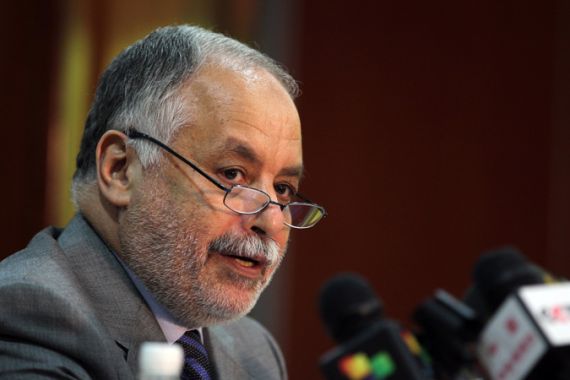Tunisia extradites Gaddafi’s last PM to Libya
Decision to send back Al Baghdadi Ali al-Mahmoudi leads to row between Tunisian PM and president.

Al Baghdadi Ali al-Mahmoudi, who served as prime minister of Libya under Muammar Gaddafi, has been placed in prison after Tunisia extradited him, Libyan officials say.
The extradition decision has touched off a row between the Tunisian president Moncef Marzouki and the prime minister as Marzouki denounced the extradition as “illegal”, in a broadside at the country’s Islamist prime minister.
A statement from Marzouki’s office denounced Jebali’s decision to extradite al-Mahmoudi, saying it had been taken without consulting him.
“President Moncef Marzouki did not sign any decree. This decision will have repercussions for the relationship between the presidency and the government,” Adnen Manser, a presidential adviser, said, giving warning of a “serious crisis”.
Imed Daimi, head of Marzouki’s presidential office, told Radio Express FM, a private Tunisian radio station, on Monday that Mahmoudi’s extradition had been “a stab in the back” and that the president of the Republic had not been informed of the decision until an hour and a half after Mahmoudi had already been handed over to the Libyan authorities.
Daimi condemned the extradition as “a major political error” that would damage both the governing coalition and Tunisia’s international reputation.
Marzouki was in southern Tunisia on Sunday for commemorations to mark the 70th anniversary of the foundation of the national army.
Mahmoudi, who was Libyan prime minister until the last days of the Gaddafi regime, was arrested on September 21 in Tunisia as he tried to flee to Algeria.
Two Tunisian court decisions backed Libya’s request to extradite him, but Marzouki had said in May he was opposed to the transfer unless Libya could guarantee it would respect Mahmoudi’s rights and give him a fair trial.
The extradition could establish a precedent for other countries who have given refuge to or arrested members of Gaddafi’s old entourage.
Libya’s government and the International Criminal Court, which indicted Gaddafi’s son Saif al-Islam in June for crimes
against humanity stemming from the crackdown on last year’s revolt, have argued for months over where he should be tried.
Libya considers it a matter of national pride and a measure of the country’s transformation for Saif al-Islam’s and other Gaddafi loyalists trials to be held in Libya.
But human rights groups have questioned whether Libya’s justice system can meet the standards of international law and say he should be handed over to the ICC instead.
Test for judiciary
A Libyan defence ministry official, Mohammed al-Ahwal, said that a helicopter transferred Mahmoudi to the capital Tripoli.
“As a result of the intense diplomatic efforts undertaken by the Libyan interim government … the Libyan government has received today Al-Baghdadi Ali Al-Mahmudi,” Abdel Rahim al-Kib, prime minister of Libya’s interim government, said on Sunday.
“The Libyan government promises that the accused man will be treated well, in accordance with our religious teachings, and in accordance with of international standards of human rights,” he said.
Kib said Mahmoudi was being held in a prison under supervision of the ministry of justice and the judiciary police.
Earlier on Sunday, Ridha Kazdaghli, a spokesperson for Tunisia’s prime minister, Hamadi Jebali, confirmed Mahmoudi’s transfer to Tripoli.
“The return of Baghdadi al-Mahmoudi is hugely significant, not just because of who he is, but because of what it means for Libya’s fledgling judicial process,” Al Jazeera’s Paul Brennan reported from Tripoli.
‘State crime’
Mabrouk Khorchid, Mahmoudi’s lawyer in Tunisia, said neither he nor the Mahmoudi’s family had been given any prior warning that he was about to be extradited.
“I believe this is a state crime and is against human rights,” he said.
“This is a sad moment for human rights in Tunisia. I think he’s going to be tortured and treated illegally and believe that those who handed him over bear part of the responsibility.”
Khorchid said he had not been allowed to see his client for 20 days and had heard that Mahmoudi had been placed in solitary confinement and had suffered a nervous breakdown since Tunisia’s justice minister said last month that an extradition was imminent.
“We called the presidency and they said they had not signed the extradition order and we were surprised that he was handed over like this,” he said.